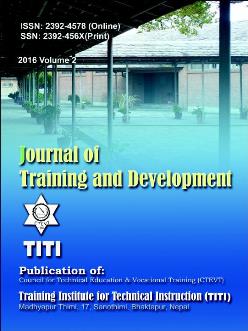Reflecting Rapid Market Appraisal: A Practical Tool for Training Needs Analysis
DOI:
https://doi.org/10.3126/jtd.v2i0.15438Keywords:
Job market, training need analysis, curriculum development, training design and technical training providersAbstract
In my understanding, Rapid Market Appraisal (RMA) is a comprehensive study of an employment status in the specific occupational area at the particular local level. At the cross road of my job career, I came to know that the development of this process grew out of a frustration with lengthy, costly and intensive formal market survey. I argue that this process provides a quick, flexible and effective way of collecting, processing, and analyzing information and data about labour markets. It explores information about the vocational-technical training institutions working effectively in the respective field. It also supplies detailed information like occupational opportunities, training needs, individual needs, and future prospective in the work of world at local level. Based on my practical experiences, I claim it as one of the effective tools for assessing the training needs for training design for the under-developing countries.
Downloads
Downloads
Published
How to Cite
Issue
Section
License
Authors who publish with this journal agree to the following terms:
- Authors retain copyright and grant the journal right of first publication with the work simultaneously licensed under a Creative Commons Attribution License that allows others to share the work with an acknowledgement of the work's authorship and initial publication in this journal.
- Authors are able to enter into separate, additional contractual arrangements for the non-exclusive distribution of the journal's published version of the work (e.g., post it to an institutional repository or publish it in a book), with an acknowledgement of its initial publication in this journal.
- Authors are permitted and encouraged to post their work online (e.g., in institutional repositories or on their website) prior to and during the submission process, as it can lead to productive exchanges, as well as earlier and greater citation of published work (See The Effect of Open Access).




